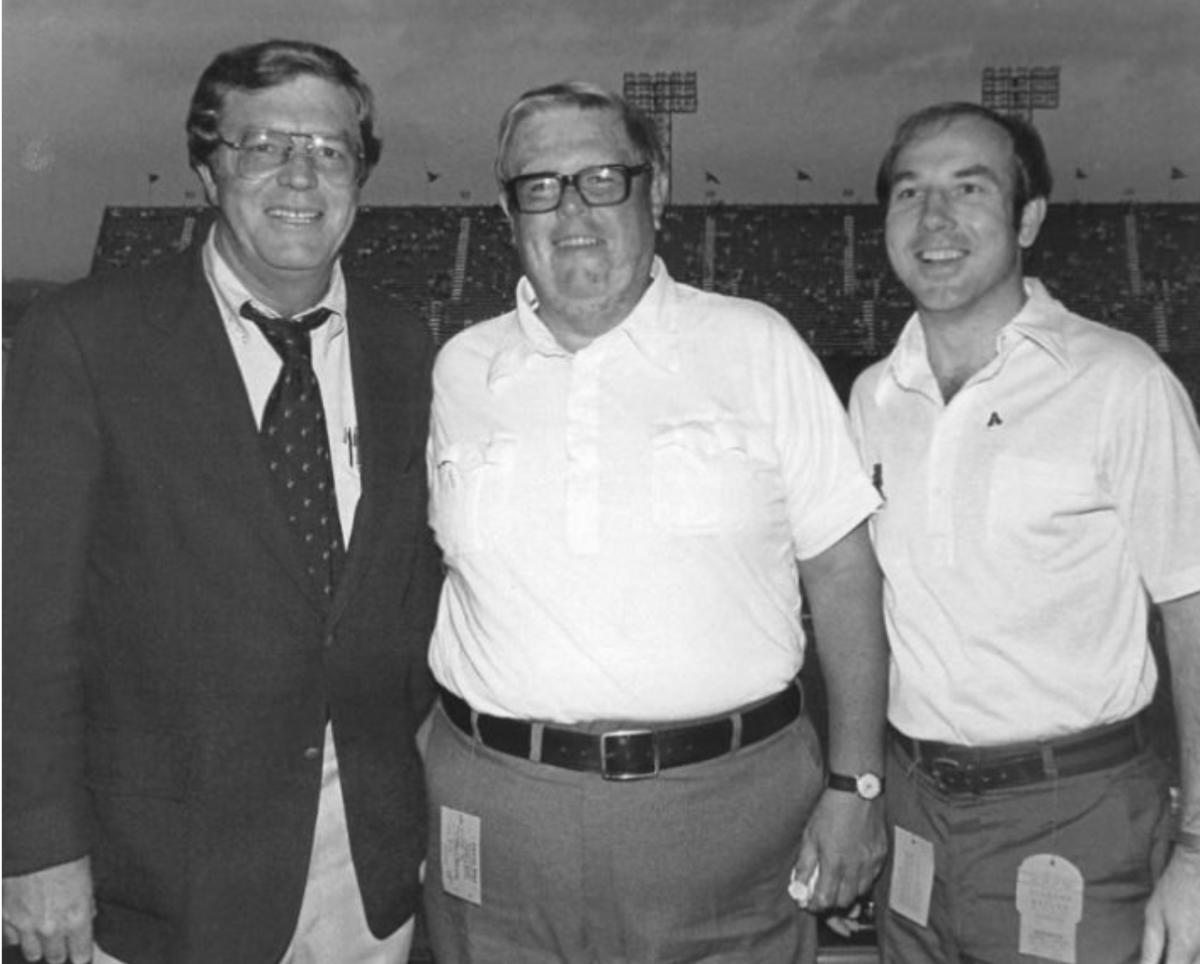Undersized Yet Underestimated: The Jerry Duncan Story

When speaking to any former University of Alabama football players that played in the late 1950s through the early 1980s, you can’t have a conversation without bringing up legendary coach Paul ‘Bear’ Bryant.
The same rings true for former Crimson Tide offensive tackle Jerry Duncan, who played under Bryant from 1962-1966.
“Coach Bryant was a tremendous motivator,” Duncan said. “You could look at the guys that he won with back in the ‘60s and you know you had 185-pound tackles, 190-pound guards and 180-pound linebackers and he just beat people.”
At every turn of conversation, Duncan frequently reference Bryant and the impact that the coach had on his life.

Born in 1943 in the rural North Carolina town of Sparta, Duncan grew up loving sports, specifically football in basketball. When he reached high school, he played basketball for his small hometown school under the future Auburn basketball coach Sonny Smith.
In football, Duncan described himself as ‘untalented’ at his position of running back as well as undersized, but he still desired to play football at the college level. With neither parents having attended college, Duncan was determined to acquire an education.
Unsure of where to go, Duncan would soon find where he would play college football.
“I went to Raleigh, North Carolina for a coaching clinic,” Duncan said. “The keynote speaker at that coaching clinic was none other than Paul Bryant. I don’t know how this transpired because I was not there at that meeting but some way my coach talked coach Bryant into offering me a scholarship.
“I don’t know whether there was alcohol involved or if coach Bryant just went crazy but I think maybe he just decided to tell the guy that if he quit talking to him he’d give me a scholarship,” Duncan laughed.
Upon graduating high school, Duncan moved to Tuscaloosa to join Bryant and the Crimson Tide. However, Duncan was still small, weighing in at just 160 pounds. He played three games his freshman season but was then redshirted.
Duncan took the opportunity to put some weight on his diminutive frame.
“I kinda just got by, but I put on a little bit of weight,” Duncan said. “I think I had gotten up to 185 by my sophomore year.”
Over the next two seasons, Duncan was shifted from halfback to fullback and then to blocking guard. While Duncan was happy to be playing for Alabama, he felt like he didn’t really click with any of the positions as the college level and under Bryant’s system.
In spring training of 1965, however, Duncan found his calling.
“[Bryant] came to me one day as we were getting ready to start spring training and he said ‘I’m going to move you to tackle today,’” Duncan said. “’If I have to move you again it’ll be back to Sparta, North Carolina.’
“That wasn’t exactly what I wanted to hear, but something clicked.”

After spring training, the players headed home and Duncan spent the summer working a part-time job in Birmingham. Upon returning to campus, he found that he had been listed as the third-string tackle.
Under Bryant, it was customary that players had to run a mile to start fall practice and each player had to meet a certain amount of time in order to qualify for their position. The first-string tackle — who Duncan did not name — failed to meet the qualifying time and was kicked off the team.
Just days later, another unfortunate circumstance would occur that would benefit Duncan.
“The first day in pads the guy that had moved up from second to first-string tackle blew his knee out,” Duncan said. “Hell, now I’m down to the first-string tackle at Alabama and I don’t know who was more scared: coach Bryant or me.”
Duncan retained the starting position and became renowned for his work in Bryant’s tackle-eligible play. With the combination of quarterbacks Steve Sloan and Kenny Stabler, along with wide receiver Ray Perkins, Bryant’s play-calling and use of the tackle-eligible play led to many yards and much scoring for the Crimson Tide offense.
“We had a lot of success with the tackle-eligible play,” Duncan said. “Nobody was really worried about the tackle. They were worried about Perkins for the pass because he was so fast so we could run a tackle-eligible play just about any time we wanted to.”
Throughout his career at Alabama, Duncan points to the 1966 game in Knoxville against Tennessee as his favorite moment and favorite memory of his time with Bryant.
“When we were in Knoxville, we were playing in the mud,” Duncan said. “I mean mud. It rained hard. We were behind 10-0, and Tennessee had a very good football team. We go into the dressing room at the half and everybody’s been told that when you play in Knoxville you’re seven points behind before the game even starts because Tennessee’s going to get seven points just because they’re playing in Knoxville. So we’re really behind 17-0. We’re muddy, we’re whipped, we’re irritated, we’re mad.
“Obviously it’s running through your mind ‘can we really come back and really win this game?’ Coach Bryant comes into the dressing room and he’s the last one in and he’s clapping his hands. ‘Hey this is perfect. This is perfect,’ he says. ‘We’ve got ‘em right where we want ‘em. They actually thing they’re going to win this football game.’ I’m sitting there thinking to myself ‘what did he just say?’ So we go back out there and end up winning the game 11-10. You talk about some happy folks, that was some happy folks.”
That same 1966 season, Duncan was named an All-American at the tackle position. Despite being undersized, Duncan had proved his worth to the college football world.
After graduating with his degree in education, Duncan remained in Tuscaloosa by serving as a graduate-assistant for Bryant and helping with recruiting. His ultimate goal was to become a football coach like his idol, but with bad arthritis beginning to hinder him on the sidelines, he decided to pursue a career in financial advising at the suggestion of Bryant.
While Duncan’s career as a football player and coach were over, he returned to Bryant-Denny Stadium in the early 1970s as a sideline reporter for the University of Alabama Radio Network. While he had no formal training in broadcasting, Duncan took a liking to the job and served at the position for 24 years, all while continuing his job as a financial advisor.

In 2007, Duncan was honored by being inducted into the Alabama Sports Hall of Fame, much in part to his work with the tackle-eligible play. In his class also being inducted was also his former high school basketball coach Sonny Smith, who had concluded his days coaching at Auburn.
“It was a great honor and I’ve just been so fortunate,” Duncan said. “Just so many good things have happened to me and I have so much to be thankful for.”
Today, Duncan continues his job as a financial advisor, working in Birmingham for the United Bank of Switzerland (UBS). He is married to his wife of 35 years, Karen Presnell, who have a son together. His name?
Luke Bryant Duncan.
Duncan also has two children from a previous marriage, Evans and Melissa. All three of his children attended and graduated from the University of Alabama on the Paul W. “Bear” Bryant Scholarship, a needs-based scholarship established by Bryant to provide an education to the children of his former players.
“I always tell people that I truly feel like I’m the luckiest guy in the world because of the things that have happened to me because of Alabama,” Duncan said. “Having the opportunity to play for coach Bryant and all the people pat me on the back and I just feel like I’m the luckiest guy in the world. I’ve met so many wonderful people.”
